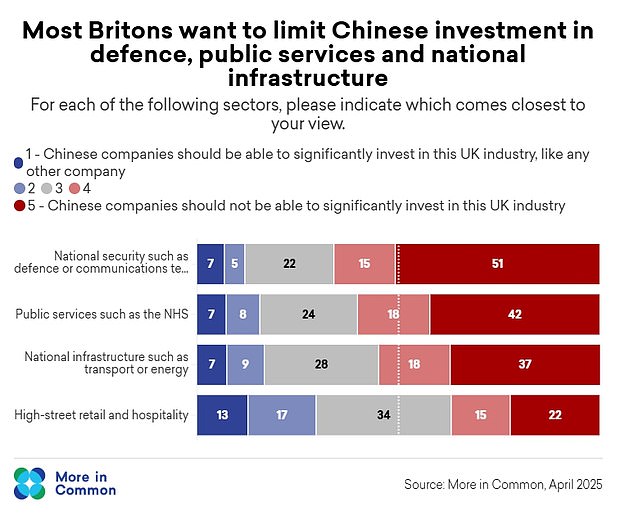Brits back shutting Chinese firms out of key parts of the economy, according to a poll.
Research by More in Common found two-thirds would prefer to see Beijing-linked companies barred from significant UK defence and communications investments.
Some 60 per cent said the same about the NHS, and 55 per cent about transport and energy.
The results emerged after the government’s dramatic move to seize control of British Steel, with claims the Chinese owner tried to shut down furnaces permanently.
Business Secretary Jonathan Reynolds said at the weekend that there would be a ‘high trust bar’ for allowing Beijing-connected companies to gain stakes in the UK in future. However, the Labour government has been engaged in efforts to woo the world’s second largest economy – as it desperately seeks ways of fuelling growth.

Research by More in Common found two-thirds would prefer to see Beijing-linked companies barred from significant UK defence and communications investments

The poll suggested broad support for reducing Chinese involvement in the UK economy
The survey suggested that Brits would support nationalising British Steel, by a margin of 54 per cent to 14 per cent.
But ministers have indicated that a commercial partner would still be their favoured option, amid concerns over costs.
They have also dodged on whether another Chinese firm could yet be allowed to become involved with British Steel – despite calls for Labour to rule out Chinese investment in ‘strategic’ sectors.
Mr Reynolds, speaking on a visit to Immingham today, said there was a need for a private sector partner ‘to work with us as a Government on a transformation programme’ to secure the long-term future of British Steel.
He also admitted there might be a ‘different employment footprint’ at Scunthorpe when asked if the Government could guarantee there would be no job losses at the plant.
‘What we need for the long-term future of British Steel is that private sector partner to work with us as a Government on a transformation programme,’ Mr Reynolds said.
‘That might be new technology, new facilities, that might have a different employment footprint. The staff here absolutely know that, they know they need a long-term future.
‘These blast furnaces have given this country nearly a century of service in one case, so they know they need the future and that might be a different model, different technology.
‘What they didn’t want was the unplanned, uncontrolled shutdown of the blast furnaces with thousands of job losses and no plan in place for the future.
‘And by what we’ve been able to do, working with the brilliant team here at British Steel, is secure the possibility of that better future – and I for one am confident that we’ve made the right decision to support the people here.’
Mr Reynolds also suggested he would ‘look at a Chinese firm in a different way’ when it comes to future involvement in the UK steel sector, following the row with Jingye.
‘In this case, our difference of opinion on the future was with a specific company,’ he added.
‘I know there’s a lot of interest in the wider UK-China relationship, understandably so but this was about this company. I think we’ve got to recognise that steel is a sensitive sector.
‘It’s a sensitive sector around the world, and a lot of the issues in the global economy with steel come from over-production and dumping of steel products, and that does come from China.

Business Secretary Jonathan Reynolds (pictured watching coal be unloaded in Lincolnshire today) said at the weekend that there would be a ‘high trust bar’ for allowing Beijing-connected companies to gain stakes in the UK in future
‘So I think you would look at a Chinese firm in a different way but I’m really keen to stress the action we’ve taken here was to step in, because it was one specific company that I thought wasn’t acting in the UK’s national interest, and we had to take the action we did.’
Trade minister Sarah Jones had earlier declined to rule out the possibility of another Chinese firm’s involvement with British Steel.
This is despite the row with Jingye over the Scunthorpe plant raising fresh fears about Chinese involvement in Britain’s critical infrastructure.
Ms Jones told Sky News: ‘At the moment, I’m not going to say yes or no to anything that isn’t at the moment on the table or being looked at.
‘Whatever the future for Scunthorpe, we want to make sure we can keep primary steel-making, we can keep steel-making in our country and we can grow that industry, not see the continued decline that we’ve had over recent years.’

Leave a Reply